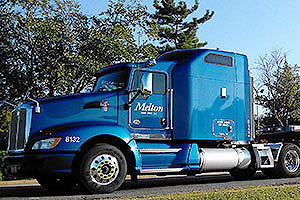Little Movement in Diesel Prices as National Average Slips 0.3¢ to $3.046 a Gallon

[Stay on top of transportation news: Get TTNews in your inbox.]
The U.S. average retail price of diesel dropped 0.3 cent to $3.046 a gallon, the Department of Energy reported Dec. 16.
Trucking’s main fuel costs 7.5 cents less than it did a year ago, when it was $3.121 a gallon, according to DOE.
The average price rose in four regions — each by less than a penny — and dropped in all others.
U.S. average #diesel fuel price on 12/16/2019 was $3.046/gal, DOWN 0.3¢/gallon from 12/09/19, DOWN 7.5¢/gallon from year ago https://t.co/iZY8C01YD5 #truckers #shippers #fuelprices pic.twitter.com/p7T2JcHQRL — EIA (@EIAgov) December 17, 2019
The sharpest drop happened in the Rocky Mountain region, where diesel prices fell 4.6 cents to $3.161 per gallon.
Diesel prices went up the most in the Lower Atlantic, by 0.7 cent, to $2.921 per gallon.
The average national price of a gallon of gasoline also fell, by 2.5 cents to $2.536. That’s 16.7 cents more than it was a year ago at this time.
West Texas Intermediate crude for January delivery fell 1 cent to $60.93 a barrel on the New York Mercantile Exchange on Dec. 18. Brent for February settlement rose 7 cents to $66.17 on the London-based ICE Futures Europe Exchange. The global benchmark crude traded at a $5.32 premium to WTI for the same month, Bloomberg News reported.
Phil Flynn, an oil analyst with Price Futures Group of Chicago, said the economic data from the United States is positive, pushing oil up. Meanwhile, oil demand in China has been consistent and demand in India, an emerging economy, is growing.
“I think the thing you have to watch is demand, demand, demand,” Flynn told Transport Topics.
What has kept demand pressures at bay has been supply. Oil inventories have been well stocked, keeping traders from pushing oil higher. But Flynn said any talk of a “glut” is not the case, at least not for long. Flynn said supply and production are slowly pulling back.
Counts of oil rigs in the United States are coming down, Flynn said, while consumers stay steady in usage.
Another issue in oil price throughout 2019 has been the trade spat between the U.S. and China. Tariffs between the two economic superpowers have kept oil prices lower than normal, Flynn said.
U.S. average price for regular-grade #gasoline on 12/16/2019 was $2.536/gal, DOWN 2.5¢/gallon from 12/09/19, UP 16.7¢/gallon from year ago https://t.co/HTkUoh1u0j #gasprices pic.twitter.com/JlaTR3WK9n — EIA (@EIAgov) December 17, 2019
When expectations were that tariffs could be lifted, oil would see a small rally. When expectations were that the trade spat would continue, oil would stall in price. Traders would often watch President Donald Trump’s Twitter account for indications, Flynn said.
“It’s been a game of that,” said Flynn. “We get a good tweet. We get a bad tweet.”
Crude supplies held in U.S. storage fell to levels not seen since early November after last week’s 1.1 million-barrel withdrawal. Still, stockpiles of gasoline, diesel and heating oil expanded even as demand rebounded, Bloomberg News reported. Warmer than usual December weather has kept a lot of heating oil in supply centers, according to Tom Kloza, global head of energy analysis for the Oil Price Information Service.

Steady fuel prices have been good for fleets like Melton Truck Lines. (Melton Truck Lines)
The price of oil being fairly stable has meant it has drifted away from the top concern for fleets.
“Fuel is probably the least of my concerns right now,” said Robert Ragan, chief financial officer for Melton Truck Lines Inc.
Ragan told TT that net cost per mile has not fluctuated much, leaving him to focus on other issues such as freight rates and productivity. Wild swings in fuel costs can cause issues with net cost per mile, and shipper costs, he said, but that has not been the case.
Still, Melton works to manage fuel costs by providing trucks with auxiliary power units, to reduce the need for idling. And Melton offers bonuses to drivers, with miles per gallon a big factor, Ragan said.
Based in Tulsa, Okla., Melton primarily is a flatbed carrier with more than 1,300 trucks, according to Ragan.
Melton ranks No. 85 on the Transport Topics Top 100 list of the largest for-hire carriers in North America.
Want more news? Listen to today's daily briefing:




